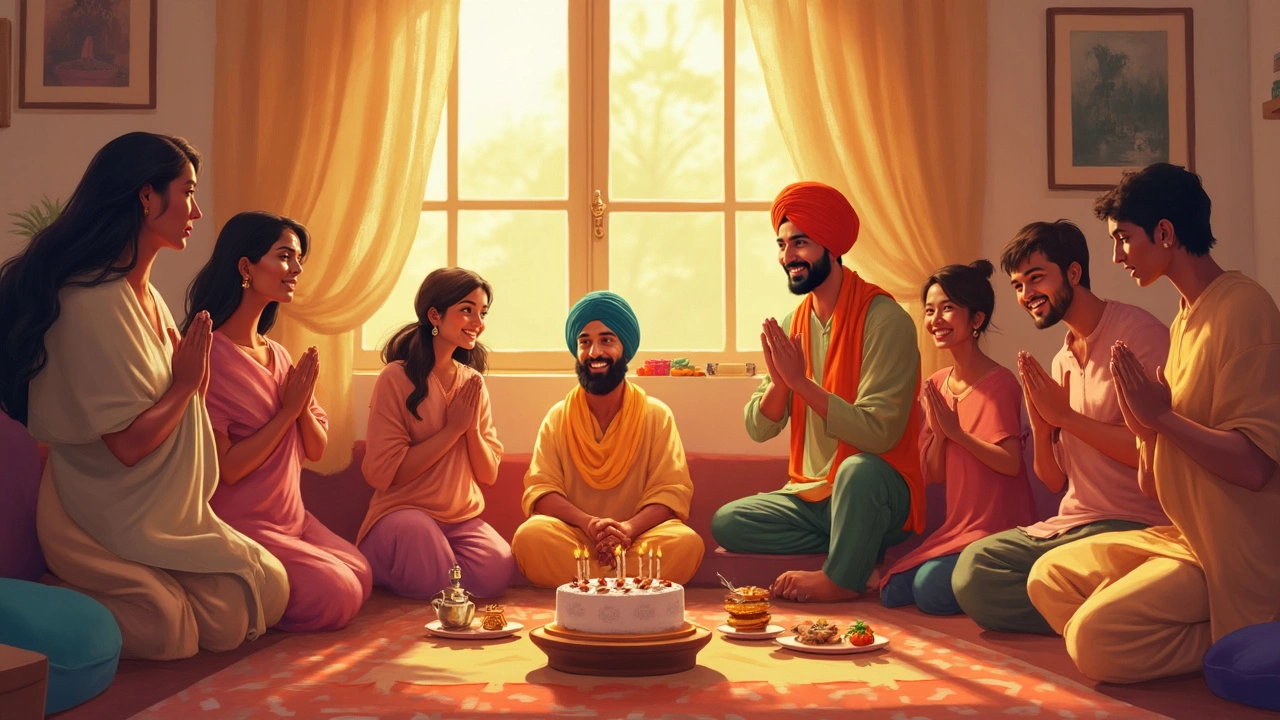How Should a Non-Sikh Greet a Sikh? Easy Ways to Show Respect
 May, 25 2025
May, 25 2025
Ever stood across from a Sikh friend and wondered, “Am I greeting them the right way?” Don’t worry, you’re not alone. Most people get nervous about making an awkward move or saying the wrong words—especially on a big day like someone’s birthday.
Here’s the good news: Sikh culture is actually super open and warm toward respectful gestures, even if you’re not from the community. What really counts is your intention. Start with a smile, and you’re halfway there. If you want to go a step further, there’s a classic Sikh greeting you should know: “Sat Sri Akal.” It’s simple, friendly, and totally safe for any occasion—even birthdays. Sikhs say this phrase as a sign of respect, and it means “God is the eternal truth.” You don’t have to pronounce it perfectly—effort matters more than getting it spot-on.
- Why Greetings Matter in Sikh Culture
- Simple Sikh Greetings for Non-Sikhs
- Birthday Wishes: What Works and What Doesn’t
- What to Avoid (and Why)
- Extra Tips for Real Connections
Why Greetings Matter in Sikh Culture
Think a greeting is just a quick hello? In Sikh culture, it runs deeper. The way you greet someone tells them how much you respect them—and respect is huge in Sikhism. Sikhs believe in showing kindness and treating everyone as equal, no matter their background, gender, or status. That’s why greetings and how you offer them can leave a real impression.
The classic greeting “Sat Sri Akal” isn’t just words—it’s a sign you acknowledge the divine in the other person. In Punjabi, it means “God is the eternal truth.” When you say it with genuine intent, it signals that you see the other person as equal and worthy of respect. It’s the greeting you’ll hear at family gatherings, birthdays, or even just running into someone at the market. In fact, it’s so common that for a lot of Sikhs, it feels incomplete to start a chat without it. Using the greet a Sikh phrase thoughtfully can completely change the vibe of a conversation.
It goes even deeper if you look at Sikh places of worship, called Gurdwaras. The first thing you’ll hear when you walk in—before any meal or ceremony—is “Sat Sri Akal.” It’s a practical way for Sikhs to practice their teachings about equality and humility.
| Greeting | Meaning | When to Use |
|---|---|---|
| Sat Sri Akal | God is the eternal truth | Anytime, all ages |
| Waheguru Ji Ka Khalsa, Waheguru Ji Ki Fateh | The Khalsa belongs to God, victory belongs to God | Formal, religious events |
For birthdays and friendly moments, stick with “Sat Sri Akal.” It’s friendly, universally recognized, and works for anyone, young or old. And you’ll almost always get a warm smile—or even a spark of surprise—that you made the effort. That’s what makes it matter so much.
Simple Sikh Greetings for Non-Sikhs
If you’re not Sikh but want to greet a Sikh friend or colleague, don’t stress about complicated rituals. The standard greeting is "Sat Sri Akal" (pronounced: Sut Sree Akaal). It’s friendly, easy to remember, and works for almost any situation—birthdays, family events, or just saying hi in passing.
Here’s what makes "Sat Sri Akal" a safe bet for everyone: Sikhs across the world—whether in India, Canada, UK, or the US—use it as a daily hello, kind of like “Hello” or “Good Morning” in English. You don’t have to be religious or know Sikh scriptures. Just use it genuinely and you’re good.
- If you want to make it extra respectful, add a slight nod or bring your palms together (like a quick “namaste” gesture), but a warm smile is honestly enough.
- You don’t have to remove your shoes or cover your head unless you’re in a gurdwara (Sikh temple). Out in the regular world, just staying kind and polite works fine.
- It’s totally okay if you mess up the pronunciation a bit. Sikhs appreciate the effort more than perfection.
Some folks also use “Waheguru Ji Ka Khalsa, Waheguru Ji Ki Fateh,” which is a longer, more formal greeting. You’ll hear this mostly in religious settings, so for day-to-day life and birthdays, stick with "Sat Sri Akal." It keeps things simple and friendly for everyone.
Just in case you’re curious about how common it is to use “Sat Sri Akal,” check out the data below:
| Country | Most Popular Sikh Greeting | % of Use Among Sikhs |
|---|---|---|
| India | Sat Sri Akal | 95% |
| Canada | Sat Sri Akal | 93% |
| UK | Sat Sri Akal | 91% |
| USA | Sat Sri Akal | 89% |
So, when in doubt, go with greet a Sikh by saying “Sat Sri Akal.” It’s the easiest way to make a Sikh person feel welcomed and respected, no matter the setting.

Birthday Wishes: What Works and What Doesn’t
When it comes to wishing a Sikh on their birthday, there are no complicated rituals or scripts you need to memorize. At the end of the day, a warm, genuine wish lands best. But if you want it to feel right and respectful, check out these simple do’s and don’ts.
- It’s always safe to start with a basic “Happy Birthday!” This is universal and never feels out of place.
- If you like to personalize things, you can say “Sat Sri Akal” before or after your wish. This greeting works for Sikhs of all ages and brings that little extra respect.
- For more Punjabi flavor, you can say, “Janamdin diyan lakh lakh vadhaiyan,” which means “many many congratulations on your birthday.” Even if pronounced with an accent, it’s usually appreciated as a nice touch.
- Cards and messages—if you’re writing, just keep it real and positive. Sikhs generally aren’t too formal with birthday cards; heartfelt and simple is best.
But not every typical birthday wish works. Here are a few things you’ll want to avoid:
- Skip religious phrases from other faiths unless you know your friend is okay with it. For example, Sikhs won’t relate to Christian, Hindu, or Islamic blessings—this can feel awkward.
- Avoid jokes about religious symbols (like turbans) or stereotypes. It’s not just rude, it kills the mood.
- Don’t assume that all Sikhs are super traditional—some might not care about the greeting at all, so when in doubt, go simple.
| Wish | Meaning | When to Use |
|---|---|---|
| Happy Birthday! | Best wishes for the occasion | Any Sikh birthday |
| Sat Sri Akal | God is the eternal truth | Start or end of any conversation |
| Janamdin diyan lakh lakh vadhaiyan | Many congratulations on your birthday | If you want to add Punjabi touch |
Basically, don’t stress about perfection. A simple, thoughtful wish shows you care. If you want to make it special, using a little Punjabi or including “Sat Sri Akal” is the easiest way to show respect and warmth to a Sikh on their big day.
What to Avoid (and Why)
Getting a greeting right with a Sikh friend isn’t complicated, but there are a few definite don’ts. Sikhs take their faith and traditions seriously, and a mistake—even an innocent one—can sometimes come across as disrespectful. Here’s how to keep things cool and thoughtful.
- Don’t use religious greetings from other faiths like "Namaste" (Hindu) or "Salaam" (Muslim) when you specifically want to greet a Sikh, especially if it’s about something personal or religious. Sikhs have their own greetings, and using the right one shows respect for their identity.
- Avoid commenting on or joking about Sikh articles of faith (such as the turban, beard, or kara—the steel bracelet). These are not just accessories—they’re a core part of Sikh beliefs and identity.
- Don’t touch a Sikh’s turban or hair. It’s considered very personal and sacred. Even if you’re close friends, this line is best not crossed unless you’re clearly invited.
- Don’t use phrases or jokes that stereotype or generalize the Sikh community (for example, avoiding the “Santa-Banta” jokes that pop culture sometimes uses in India). They’re usually offensive, even if you don’t mean harm.
- Try not to guess religion by looks. Sikhs have visible articles of faith, but not every person with a turban is Sikh, and not every Sikh wears one. If you’re not sure, just ask politely.
People worry most about accidentally causing offense, but data from a 2021 Delhi-based cultural survey showed that Sikhs overwhelmingly appreciate honest, direct communication—over 80% said they preferred someone asking questions instead of guessing or pretending to know their traditions.
| Greeting | Recommended For Sikhs? | Reason |
|---|---|---|
| Sat Sri Akal | Yes | Traditional Sikh greeting, always respectful |
| Namaste | No | Specific to Hindu tradition |
| Salaam | No | Islamic greeting |
| Happy Birthday! | Yes | Safe and friendly in any culture |
Sticking to a proper greet a Sikh approach means you value their traditions. If you slip up, a genuine apology goes a long way. Most Sikh folks understand that not everyone knows all the rules from the start.

Extra Tips for Real Connections
Getting the greeting right is a good start, but real connection goes a bit further. Sikhs value sincerity. If you’re reaching out for a birthday or just saying hi, make it personal. Avoid generic lines—if you know about their interests, mix that in. Instead of only saying “Sat Sri Akal,” try adding a friendly message. For birthdays, you could say, “Sat Sri Akal! Hope your new year is full of good food and big laughs.” It goes from a generic wish to something memorable.
Curious about the proper way to say “Sat Sri Akal”? Here’s how you break it down: “Saht” (rhymes with ‘hut’), “Sree” (like ‘three’), and “Akaal” (ah-kahl). Just try your best! Sikhs truly respect the effort, even if your accent is off.
- Eye contact matters. Sikhs consider it a sign of honesty and attention. Don’t mumble your greeting or look away.
- Don’t add random religious jargon if you’re not sure what it means. Stick to simple, direct communication. “Sat Sri Akal” really is all you need—the phrase packs lots of meaning on its own.
- If you’re sending a birthday card, writing greet a Sikh with “Sat Sri Akal” on top is a great touch. Bonus points for mentioning a shared memory or complimenting their values—Sikhs hear plenty of general wishes, but personal notes stand out.
- At community events (like a birthday gathering at a gurdwara), cover your head and take off your shoes before entering. It’s a simple show of respect that goes a long way.
And here’s something cool: most Sikhs don’t expect you to be an expert. If you’re ever unsure about how to greet or what’s appropriate, just politely ask. You’ll probably get a warm, helpful answer and maybe even learn a new tradition.